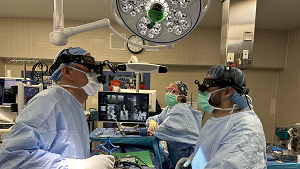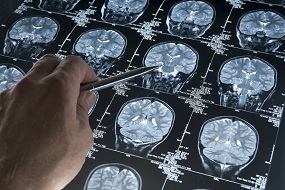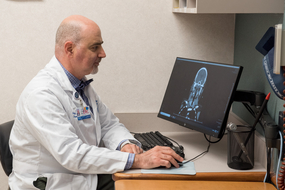
Neurology
Comprehensive care for complex neurologic conditions, including stroke, epilepsy, Parkinson’s, and ALS
Henry Ford Health neurologists deliver a level of care that’s not widely available in Michigan. Whether it’s nagging symptoms or a life-threatening emergency, we offer services and expertise that maximize your potential for healing.
You have access to advanced therapies and renowned experts who regularly treat the region’s most complex cases. Our capabilities help more people get back to their busy lives.
Neurology services at Henry Ford: Why choose us?
You receive services from compassionate neurologists, many of whom are leaders in their field. All our experts share a commitment to care excellence. Henry Ford neurologists stay up to date on the latest research and frequently have a hand in care innovations. Meet our neurologists.
We take time to get to know you as an individual and build lasting patient-provider relationships. You can expect care that’s tailored to your personal preferences and medical needs. Our teams are easy to reach between appointments, so you have convenient access to guidance and support if you need it. Many neurologists are available via virtual care.
Specialized neurology programs
Henry Ford is home to programs that specialize in treating complex neurological diseases. Our offerings include:
- Cerebrovascular Center: We offer unparalleled depth of expertise for conditions such as arteriovenous malformation (AVM).
- Cognitive Health, Neuroinflammatory and Neuromuscular Disease centers: Our highly specialized neurologists offer the latest diagnostics tools, treatments and therapies for conditions like MS, myasthenia gravis, Alzheimer’s, dementia and more.
- Epilepsy Center: Henry Ford is one of the largest nationally recognized epilepsy centers in Michigan.
- Movement Disorders Center: You receive care from a team with decades of experience treating Parkinson’s disease, tremors and more.
- Stroke and Neurovascular Disease Center: We were the first hospital in Detroit to earn Comprehensive Stroke Center designation – the highest level of certification.
Our team approach
Neurologic diseases are often complex and require the services of multiple specialists. Our team approach means specialists work together to tailor therapies, giving you the best chances for good results.
In addition to neurologists, you may receive care from specialists representing:
- Ear, nose and throat care
- Integrative medicine
- Neuropsychology
- Neuroradiology (brain imaging)
- Neurosurgery
- Pain management
- Pharmacy
- Physiatry (physical medicine)
- Physical therapy
Show Me


Henry Ford Health Doses First Patient in Combination Immunotherapy Trial for Newly Diagnosed Patients with Glioblastoma

Gilbert Family Foundation Contributes Nearly $375 Million in Partnership with Henry Ford Health to Bring Shirley Ryan AbilityLab to Detroit and Create the Nick Gilbert Neurofibromatosis Research Institute
- World-renowned Shirley Ryan AbilityLab to partner with Henry Ford Health on inpatient rehabilitation hospital embedded within new patient tower at Henry Ford Hospital, with plans for expansion
- First-of-its-kind neurofibromatosis (NF) institute, named after Dan and Jennifer Gilbert’s late son, Nicolas, to house groundbreaking research advancing toward a cure for NF and increasing access to personalized care
- Nick Gilbert Neurofibromatosis Research Institute to be housed inside the groundbreaking new Henry Ford Health + Michigan State University Health Sciences research facility

Henry Ford Hospital, Henry Ford Jackson Hospital Earn Stroke Care Recertifications from The Joint Commission

The Connection Between Your Gut Health And Parkinson’s Disease
Experts are looking to the gut to learn more about how changes to gut microbiome diversity may cause or worsen symptoms of Parkinson's disease.

The Egg-citing Link Between Eggs And Brain Health
Eggs contain several nutrients that could boost your brain health and prevent cognitive decline. Find out about the science behind these claims.

Left Versus Right Side Stroke: How Stroke Location Impacts The Body Differently
The side of the brain – left or right – that is affected by the stroke can also indicate what type of symptoms you might experience or what functions are impacted as a result.

Not All Seizures Are Caused By Epilepsy. Here’s What A Neurologist Wants You To Know
Non-epileptic seizures may look similar or be just as distressing as an epileptic seizure, but what causes them, how they affect the body and how they are treated are different.
.svg?iar=0&hash=F6049510E33E4E6D8196C26CCC0A64A4)

/hfh-logo-main--white.svg?iar=0&hash=ED491CBFADFB7670FAE94559C98D7798)
